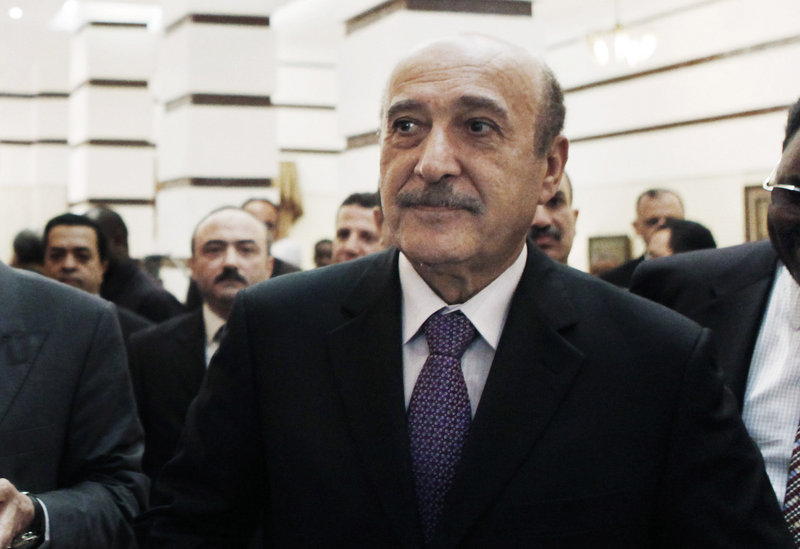CAIRO – Egypt’s former spy chief Omar Suleiman, deposed President Hosni Mubarak’s top lieutenant and keeper of secrets, died Thursday, the country’s official news agency reported. He was 76.
Suleiman, who served as vice president during Mubarak’s final days in office, and said little but had a finger in virtually every vital security issue confronting Egypt, was dubbed by the media as “the black box.”
Like Mubarak, he was a fierce enemy of Islamists in Egypt and throughout the region, and a friend to the United States and Israel.
After the revolution, Suleiman disappeared from public view only to return earlier this year as a presidential candidate, sparking fears of a Mubarak regime comeback. He said he ran to try to prevent the Muslim Brotherhood’s rise to power, but he was disqualified and in the end an Islamist leader, Mohammed Morsi, won the presidency for the first time in Egypt’s history.
The official Middle East News Agency said that Suleiman had suffered from lung and heart problems for months and his health condition had sharply deteriorated over the past three weeks.
He died of a heart attack early Thursday while undergoing medical tests at a hospital in Cleveland, MENA reported, citing an unidentified Egyptian diplomat in Washington. His three daughters will accompany the body to be buried in Egypt, the agency said.
An intelligence official said Suleiman would receive a military funeral, a decision that was likely to anger pro-democracy activists who see it as a way to honor a man they despise as the main henchman in Mubarak’s repressive regime.
Unlike many ex-regime figures who have been imprisoned or put on trial over a catalogue of corruption charges, Suleiman never faced legal action.
But he was among the top military and security officials who testified in Mubarak’s trial. He denied that Mubarak issued direct orders to use violence against protesters but hinted that Mubarak learned about killings when he ordered formation of a committee to investigate the killings and injuries. The ousted leader was convicted of failing to stop the killing of protesters during the uprising and sentenced to life in prison.
A leading member of the Brotherhood said Suleiman’s death means the loss of a wealth of information about the Mubarak regime. “He left with big secrets,” Essam el-Erian said in a tweet.
Hossam Sweilam, a former general who had known Suleiman since the 1950s when they both joined the military academy, said Suleiman’s lack of political ambition helped him keep his job during nearly two decades as the director of the intelligence agency in a paranoid regime.
“There was no intelligence chief who survived that long but Suleiman,” he said. Mubarak was known to fear and get rid of politicians who rise in prominence.
Suleiman was appointed vice president on Jan. 29, 2011, at the peak of last year’s revolution, a last-gasp attempt by Mubarak to save his political life as hundreds of thousands of Egyptians took to the streets demanding his ouster. But the desperate measures, including talks between Suleiman and the formerly outlawed Muslim Brotherhood, were unable to stave off Mubarak’s overthrow.
“He tried to rescue the regime from sinking at the very last stage because he is a man with strong loyalty to the political leadership,” Sweilam said.
It was Suleiman who grimly appeared on television on Feb. 11, 2011, to announce that Egypt’s leader of nearly three decades was stepping down and handing power to a military council.
This marked the end of the 18-day uprising but opened up a new chapter of tumultuous transition under the rule of the generals.
Suleiman’s sudden emergence as a presidential candidate and his disqualification along with the two Islamist front-runners raised suspicion that the bid was orchestrated by the military generals to get rid of Islamists.
In April, Suleiman said he decided to run to prevent the Muslim Brotherhood from coming to power. “If the Brotherhood’s candidate wins the presidential election, Egypt will be turned into a religious state. All state institutions will be controlled by the Brotherhood,” he said in April.
Suleiman served as intelligence chief for nearly two decades. For most of that time he played a behind-the-scenes role as the top official in charge of some of the most important issues facing the Egyptian state, including relations with the United States, Israel and the Palestinians.
He was widely believed to be the military leadership’s preferred successor to Mubarak. This created silent tension between Suleiman and the president’s younger son, Gamal, who was seen as being groomed by his father as a rival successor.
Send questions/comments to the editors.



Success. Please wait for the page to reload. If the page does not reload within 5 seconds, please refresh the page.
Enter your email and password to access comments.
Hi, to comment on stories you must . This profile is in addition to your subscription and website login.
Already have a commenting profile? .
Invalid username/password.
Please check your email to confirm and complete your registration.
Only subscribers are eligible to post comments. Please subscribe or login first for digital access. Here’s why.
Use the form below to reset your password. When you've submitted your account email, we will send an email with a reset code.